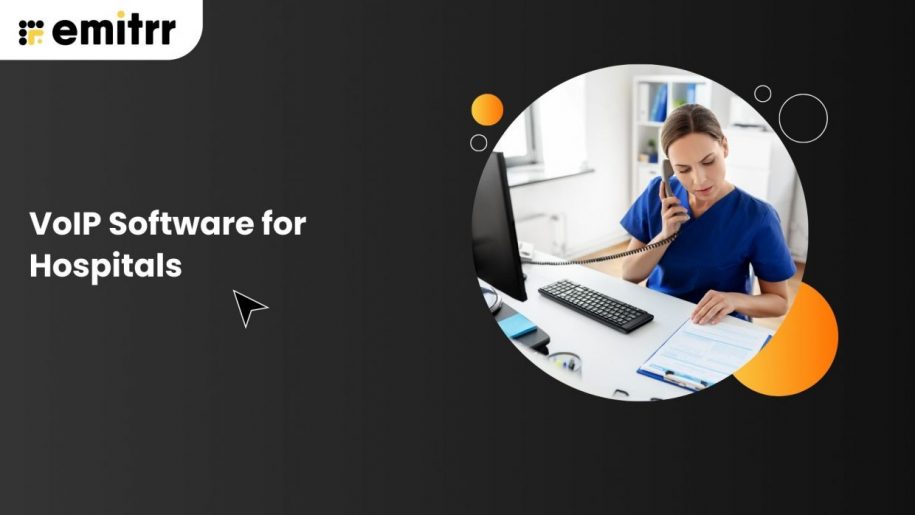Overview
VoIP software for hospitals is quickly becoming essential, offering a modern and cost-effective alternative to traditional landline and PBX systems. This technology enables seamless communication between staff, patients, and external partners, making it a vital asset in the fast-paced healthcare environment.
As the healthcare industry increasingly adopts unified communication—integrating voice, text, and video—VoIP phone systems for healthcare stand at the forefront of this transformation. VoIP for hospitals not only enhances collaboration but also drives significant cost savings and operational efficiency, which is why hospitals are actively switching to healthcare VoIP solutions.
In this guide, we’ll explore how VoIP for healthcare is reshaping communication in the industry, the advantages it offers over traditional systems, and the difference between HIPAA-compliant VoIP software and service providers. Hospitals can make informed decisions about upgrading their hospital phone system by understanding these key aspects.
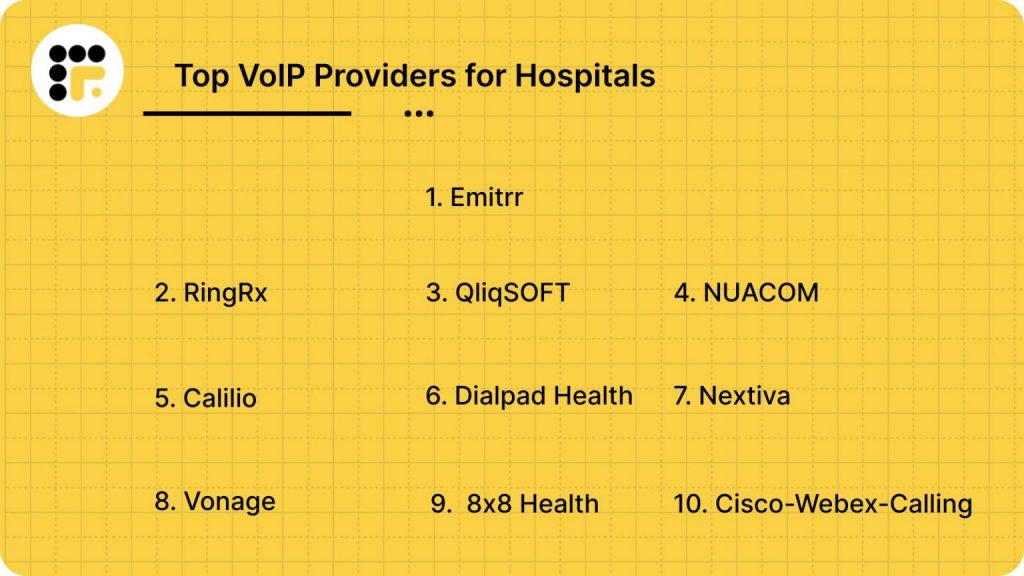
Features to Look for in Hospital VoIP Providers
When selecting a VoIP software for hospitals, it’s crucial to prioritize specific features that cater to the needs of phone systems for healthcare industry. These include:
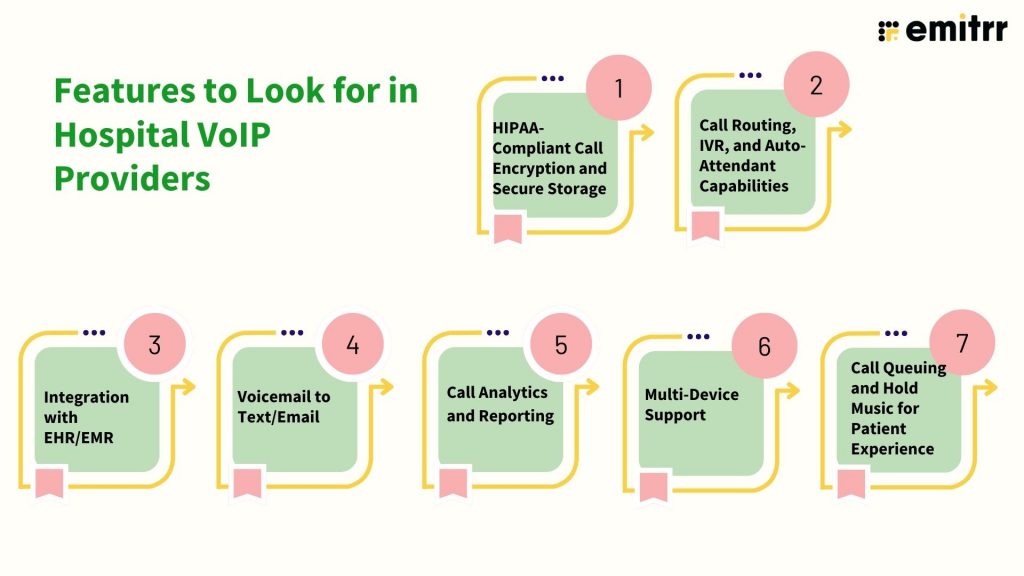
HIPAA-Compliant Call Encryption and Secure Storage
A HIPAA-compliant phone system for healthcare is essential. VoIP software for hospitals must offer encrypted communication channels to ensure the privacy and security of patient data. Call records and other sensitive communications should be securely stored and protected in line with HIPAA guidelines.
Call Routing, IVR, and Auto-Attendant Capabilities
Effective call routing is crucial for large hospitals where patients or staff need quick access to the right department. Interactive Voice Response (IVR) and auto-attendant systems help route calls based on pre-defined menu options, ensuring that no call goes unanswered—an essential function in any hospital phone system.
Integration with EHR/EMR
Integrating VoIP phone systems for healthcare with Electronic Health Records (EHR) or Electronic Medical Records (EMR) systems like Epic, DrChrono, or Athenahealth allows doctors and administrative staff to retrieve patient information during calls, improving the speed and accuracy of services.
Voicemail to Text/Email
This feature, offered by VoIP for hospitals, automatically converts voicemail messages into text, allowing staff to read and prioritize messages without needing to listen to them. This is particularly useful for busy healthcare providers who may be unable to answer calls immediately especially in large-scale healthcare phone systems.
Watch how it works in this quick demo:
Call Analytics and Reporting
VoIP software for hospitals can benefit from call analytics, which helps track call volume, response time, and duration. This data allows administrators to improve internal processes, optimize staff schedules, and track KPIs across their hospital phone systems.
Multi-Device Support
Hospitals need healthcare phone systems that support multiple devices, including desktops, mobile phones, and softphones. This flexibility offered by hospital phone systems is important for staff working across departments or remote care providers offering telemedicine.
Call Queuing and Hold Music for Patient Experience
Effective call management can improve the patient experience. Call queuing ensures that callers are placed in a line and answered promptly, while hold music or messages can provide reassurance during wait times—a must-have in modern phone systems for healthcare.
Security & Compliance Requirements for Hospital VoIP
Security is a top priority in VoIP healthcare settings. VoIP software for hospitals must meet strict compliance requirements to ensure patient safety and privacy.
HIPAA compliance
Healthcare VoIP systems must encrypt all communications—voice, video, and text—to ensure that patient data remains private. Data storage must also meet HIPAA’s strict requirements for phone systems for healthcare industry.
TCPA and FCC adherence
Hospitals must ensure their VoIP software for hospitals complies with TCPA and FCC guidelines regarding automated messages and patient calls.
SLA (Service Level Agreement) requirements
A strong SLA ensures hospital phone systems meet uptime, support, and performance benchmarks—critical for uninterrupted healthcare delivery.
Data center compliance (SOC 2, ISO 27001)
VoIP providers hosting phone systems for healthcare should use SOC 2 and ISO 27001-compliant data centers to meet top-tier security standards.
Integrations Required for Hospital VoIP Systems
A VoIP software for hospitals must integrate smoothly with various tools to ensure comprehensive communication capabilities. This is essential to fully leverage the potential of VoIP for healthcare and optimize phone systems for healthcare.
EHR/EMR systems
Integrating VoIP phone systems for healthcare with Electronic Health Records (EHR) or Electronic Medical Records (EMR) systems allows healthcare providers to access patient data instantly during calls, improving the quality of care and decision-making. This feature offered by VoIP for hospitals is a must-have in any modern hospital phone system or healthcare phone system.
CRM/Patient engagement tools
Integrating with customer relationship management (CRM) tools and patient engagement platforms ensures that patient interactions are tracked and managed efficiently, leading to improved care and patient satisfaction. These integrations offered by VoIP for hospitals add immense value to phone systems for the healthcare industry, especially in large-scale hospital phone systems.
Texting & Communication tools
VoIP healthcare systems should also integrate with texting and other communication tools, enabling hospitals to engage with patients through multiple channels—text, email, or voice. This increases the convenience and accessibility of healthcare services, making healthcare VoIP a powerful upgrade from traditional systems.
If you’re navigating HIPAA requirements while using text messaging, this quick video breaks down what HIPAA-compliant texting actually involves.
Scheduling platforms
Seamless integration with scheduling platforms allows healthcare providers to make appointments, reschedule, or confirm patient visits directly through their healthcare phone system, saving time for both staff and patients. This functionality is crucial for any modern hospital phone system.
Billing/RCM integrations
Billing and Revenue Cycle Management (RCM) integrations allow for better management of financial processes, including payment collections, invoices, and claim processing, all within the same platform. These features further enhance the efficiency of VoIP phone systems for healthcare and solidify their role in advanced phone systems for healthcare.
How VoIP Phone System for Healthcare Providers Help Hospitals?
Some key benefits that VoIP software for hospitals are:
Streamlined internal communication
VoIP for hospitals simplifies internal communication, allowing staff and departments to easily connect, whether it’s for urgent matters, consultations, or administrative tasks. The result of using a robust VoIP software for hospitals is better collaboration and faster decision-making in the hospital environment. This makes hospital phone systems far more efficient than traditional alternatives.
Immediate access to health records
VoIP phone systems for healthcare enable providers to quickly access patient health records during calls or consultations, resulting in quicker and more informed decision-making. This is especially beneficial in emergency care, where every second counts. Such integration is what sets apart modern healthcare phone systems.
Cost savings
Hospitals can save significantly on communication costs by switching to healthcare VoIP. With no need for expensive phone lines or hardware maintenance, hospitals can reallocate those funds to improve patient care. This makes VoIP phone system for healthcare not just a technological upgrade but a cost-effective solution.
Improved call quality and reduced dropped calls
VoIP for healthcare technology offers clearer, more reliable call quality compared to traditional landline systems, reducing the occurrence of dropped calls and miscommunications, critical in healthcare settings. That’s why more facilities are upgrading to hospital phone systems powered by VoIP.
How to Choose the Right VoIP Provider for Hospitals?
When evaluating potential VoIP phone system for healthcare, you should consider the following factors:
Create a Checklist Based on Hospital Size and Department Needs
Different departments within a hospital will have varying communication needs. Create a checklist based on hospital size, patient volume, and department functions to ensure the VoIP phone system for healthcare can cater to specific requirements. This is essential when selecting the best hospital phone system or phone systems for healthcare that meet your facility’s needs.
Look at Ease of Integration with Your Current Tech Stack
The VoIP phone systems for healthcare should integrate smoothly with your existing software, such as EHRs, CRMs, and billing systems. This feature of VoIP for hospitals ensures a seamless workflow, reduces manual data entry, and improves communication efficiency, directly benefiting patient care and administrative operations. Proper integration is a key feature of modern healthcare phone systems.
Prioritize Usability for Both Medical and Non-Technical Staff
Choose a system with an intuitive interface that can be easily used by both clinical staff and administrative teams. A user-friendly system reduces training time and ensures all employees can quickly adapt to the new communication tools, enhancing overall hospital efficiency. This usability factor offered by VoIP for hospitals is crucial when selecting the right healthcare phone system or VoIP for healthcare.
Compare Pricing Tiers: Per User vs Per Location
Consider the pricing structure—whether it’s per user, per location, or a hybrid model—and evaluate it based on your hospital’s budget and size.
Check Provider’s Healthcare Client Portfolio and Support
Examine the provider’s experience in the healthcare sector and their support options, ensuring they offer 24/7 assistance for hospital operations.
To know more about HIPAA-compliant phone system watch our YouTube video:
Top VoIP Providers for Hospitals
Here is a list of top VoIP providers tailored to healthcare needs, highlighting their key features, pricing, and other details.
- Emitrr
- RingRx
- QliqSOFT
- NUACOM
- Calilio
- Dialpad Health
- Nextiva (Healthcare Edition)
- Vonage for Healthcare
- 8×8 Health
- Cisco Webex Calling (Healthcare Edition)
1. Emitrr : Best VoIP Competitor
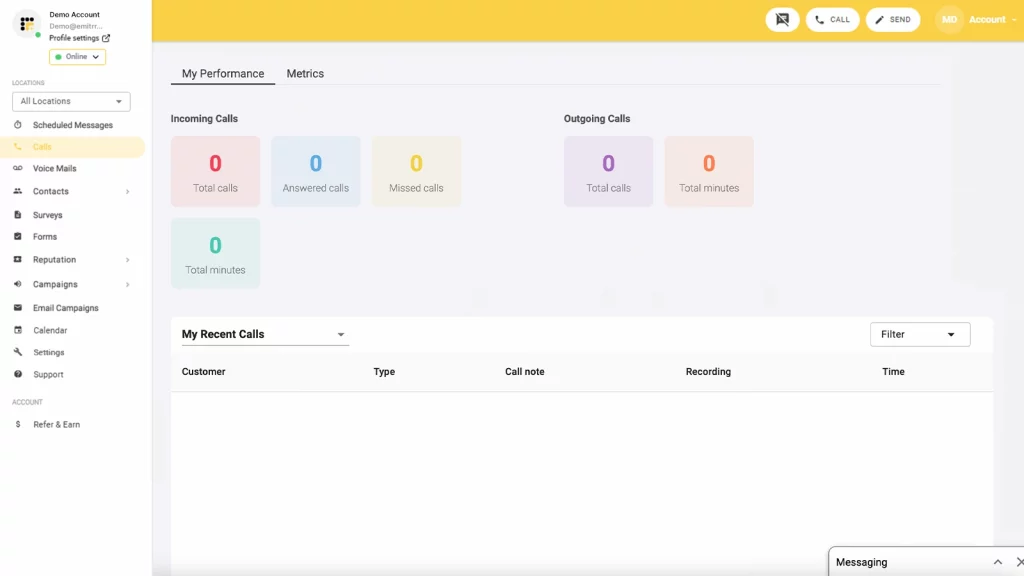
What is Emitrr?
Emitrr is a unified communication platform designed specifically for healthcare. With features that combine VoIP calling, SMS, appointment reminders, and more, Emitrr helps hospitals streamline both internal and patient-facing communication.
Emitrr Key Features:
- HIPAA-compliant phone system – Safeguards patient conversations with full healthcare privacy compliance.
- VoIP, SMS, and automated reminders – Combines calling, texting, and reminders in a single platform.
- Missed call, text-back, and voicemail drop – Keeps patient communication active even when calls are missed.
- Seamless EHR/CRM integrations – Works effortlessly with tools like DrChrono and Athenahealth.
- Call recording, analytics, and role-based access – Provides insights and secure access controls for better management.
Emitrr Pros:
- All-in-one communication suite
- Easy-to-use interface for medical and non-medical staff
- Real-time onboarding and support
Emitrr Cons:
- Focuses primarily on small to mid-sized healthcare practices
Emitrr Pricing:
This robust HIPAA-compliant phone system offers two pricing plans:
- Standard Plan ($20/user/month): Includes 1,000 call minutes, mobile access, call routing, call queues, recording, and business hours configuration. Ideal for smaller hospitals or clinics that require essential, cost-effective VoIP features to streamline internal and patient communication.
- Professional Plan ($25/user/month): Adds advanced tools like IVR menus, call transcription, automatic text replies for missed calls, conference calling, and full HIPAA-compliant phone system for healthcare. Perfect for medium to large hospitals looking for secure, scalable communication with enhanced patient engagement and operational control.
Best For: Clinics, specialty hospitals, and growing practices with multiple locations
Rating: 4.7 out of 5 stars on G2

2. RingRx
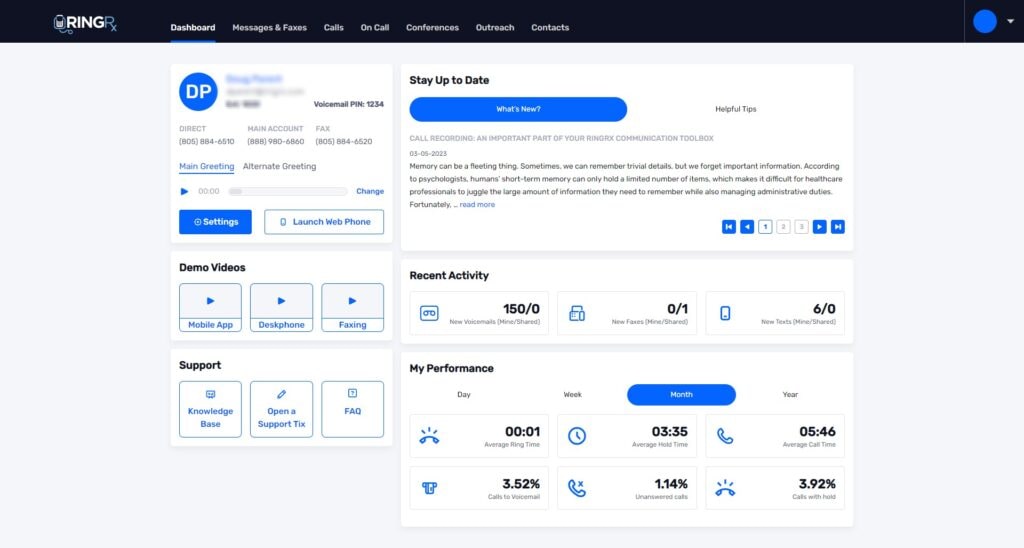
What is RingRx?
This VoIP for hospitals is designed exclusively for healthcare. RingRx provides a simple, secure, and scalable HIPAA-compliant phone system for healthcare. Let’s go through other details of this medical phone system:
Ringrx Key Features:
- Encrypted VoIP and SMS – Protects every call and text with end-to-end security.
- Customizable IVR and call routing – Directs patients to the right department with tailored call flows.
- Voicemail transcription to email – Converts voicemails into text and sends them straight to your inbox.
- API for integrations – Easily connects with other healthcare tools for a seamless workflow.
Ringrx Pros:
- Healthcare-specific design
- Competitive pricing
- Free device with some plans
Ringrx Cons:
- Limited native integrations beyond EHR
Ringrx Pricing:
This HIPAA-compliant VoIP phone system iffers three pricing plans:
- Lite Plan – $15/user/month: A complete business phone system designed for practices of any size. Includes core VoIP features such as a dedicated business number, unlimited calling (inbound and outbound), and HIPAA-compliant VoIP. Best suited for smaller clinics or solo practitioners needing a secure, no-frills voice solution.
- Grow Plan – $19/user/month: Offers a fully integrated communication suite with voice, fax, and text. Includes all Lite features plus web-based faxing, team and patient messaging, voicemail transcription, and RingRx On-Call routing. Ideal for growing offices that want to streamline their patient communication workflows.
- Clinic Plan – $25/user/month: A business-class VoIP system for larger or multi-provider practices. Includes all Grow features and adds a free desk phone, dual HIPAA-compliant voicemail boxes, both web and machine faxing, and access to virtual conference rooms. Perfect for established hospitals and specialty clinics seeking a comprehensive communication hub.
Best For: Small healthcare facilities and solo practitioners
Rating: 1.5 out of 5 stars
3. QliqSOFT
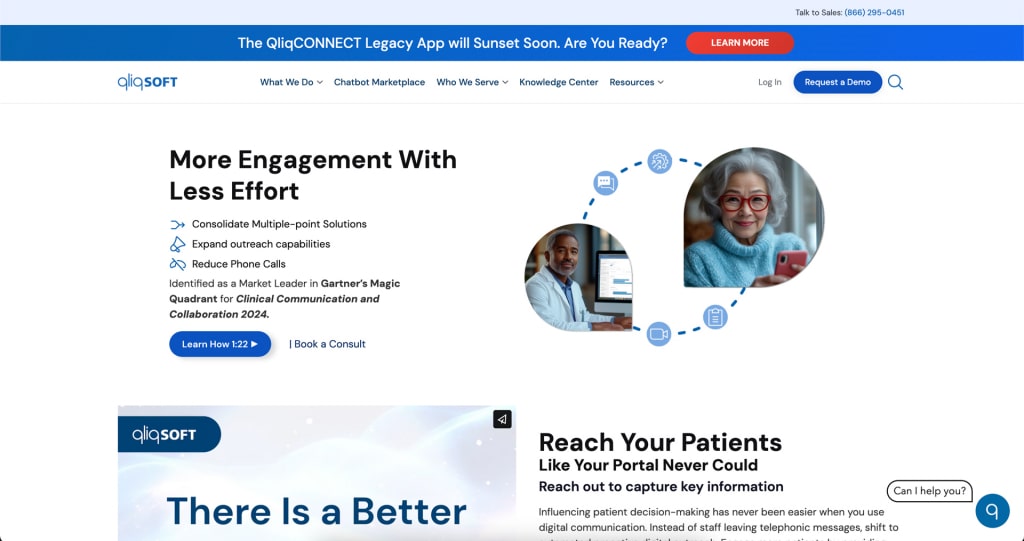
What is QliqSOFT?
QliqSOFT, another HIPAA-compliant phone system for healthcare, offers secure communication tailored for healthcare organizations. Its VoIP features are part of a broader secure collaboration suite that includes telehealth and texting. Here are other details about this medical phone system:
QliqSOFT Key Features:
- Secure VoIP calls and messages – Keeps all voice and text communication fully protected.
- Telehealth module with EHR integration – Connects virtual care directly with patient records.
- Custom chatbots and automated workflows – Streamlines patient interactions and routine tasks.
- Audit trails for compliance – Maintains detailed records to ensure regulatory compliance.
QliqSOFT Pros:
- Strong focus on privacy and compliance
- Flexible deployment options
QliqSOFT Cons:
- Complex setup for smaller teams
QliqSOFT Pricing:
The pricing for this VoIP software for healthcare is available upon request.
Best For: Mid-to-large hospitals needing advanced compliance features
Rating: 4.6 out of 5 stars on G2
4. NUACOM
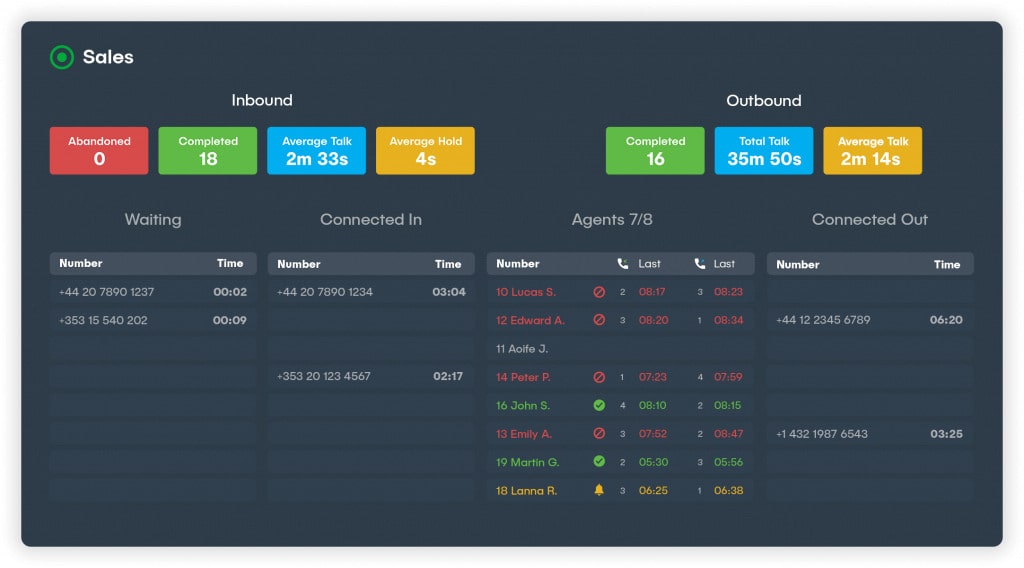
What is NUACOM?
NUACOM provides a robust HIPAA-compliant VoIP system with a strong focus on call center and CRM integrations, ideal for healthcare facilities with high inbound/outbound volumes. This medical phone system offers different features which are as follows:
NUACOM Key Features:
- Smart call routing and IVR – Excels in call routing and directs callers to the right team or department.
- CRM integrations – Syncs patient and client data with your existing CRM tools (HubSpot, Salesforce, etc.).
- Call recording and real-time dashboards – Tracks conversations and performance with live insights.
- Role-based access controls – Restricts system access based on staff roles for added security.
NUACOM Pros:
- Ideal for front-desk and billing departments
- Multi-device and browser support
NUACOM Cons:
- Not tailored exclusively for healthcare
NUACOM Pricing:
This VoIP software for healthcare offers three pricing plans:
- Unlimited Plan – $24.99/user/month (2 user minimum): Built for healthcare teams needing robust communication with global reach. Includes unlimited mobile and landline calls to 20+ countries, a free local number, and access via desktop & mobile apps. Comes with essential VoIP features like virtual queues, group extensions, call analytics, auto call recording, IVR, CRM integrations, and more.
- Enterprise Plan – $34.99/user/month (2 user minimum): Designed for growing healthcare networks and enterprise-level hospitals. Includes everything in the Unlimited Plan, plus advanced call reporting, live wallboards, call coaching, queue call-back, after-call wrap-up, softphone announcements, auto-dialer, and enhanced CRM/helpdesk integrations.
- Custom Plan – Contact Sales: Tailor-made solution for hospitals with unique operational needs. Offers custom plan-building with options for volume discounts, API developer support, dedicated account management, premium SLAs, and custom feature development. Ideal for large health systems or specialized care facilities.
Best For: Hospitals with heavy call traffic and billing needs
Rating: 4.8 out of 5 stars on G2
5. Calilio
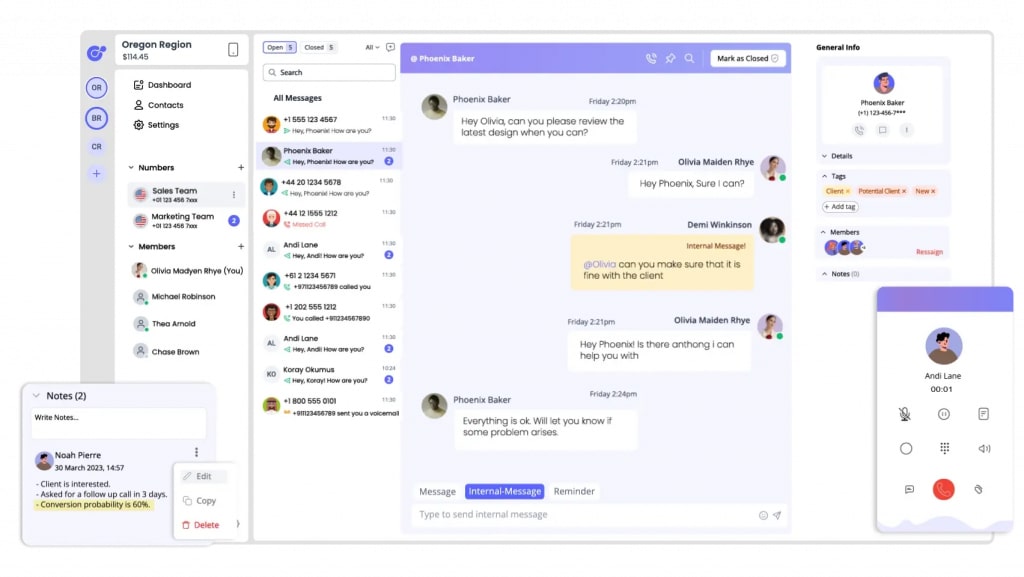
What is Calilio?
Calilio is a modern VoIP software for healthcare that emphasizes analytics and operational efficiency. While not healthcare-exclusive, it offers the tools hospitals need for voice, SMS, and video communication. Here are other details about this cloud-based VoIP phone system for healthcare:
Calilio Key Features:
- Call analytics and agent performance monitoring – Measures call data and staff efficiency with detailed insights.
- Voicemail to email/text – Sends voicemail messages directly to your inbox or phone as text.
- SMS and call scheduling – Lets you plan texts and calls in advance for timely communication.
- Call queuing and IVR – Organizes incoming calls and guides patients with an interactive menu.
Calilio Cons:
- Limited EHR integration options
Calilio Pricing:
This HIPAA-compliant call center software for healthcare offers three pricing plans:
- Basic Plan – $12/user/month (Billed Annually): A cost-effective option for small practices and startups exploring VoIP solutions. Includes up to 10 users, 1 free local number (US or Canada), call box features, call recordings (optional), and a basic real-time dashboard. Ideal for solo practitioners or clinics just starting with digital communication.
- Business Plan – $28/user/month (Billed Annually): Built for growing healthcare facilities and outpatient call centers. Includes everything in the Basic Plan, plus unlimited users, live call monitoring, advanced reporting (coming soon), and a detailed real-time dashboard. Perfect for departments looking to scale operations while keeping visibility and performance in check.
- Enterprise Plan – Custom Pricing (Billed Annually): A tailored VoIP package for large hospitals and enterprise-grade networks. Includes all Business Plan features plus queue call-back (coming soon), complete call strategy tools, a dedicated account manager, and support via phone and WhatsApp. Built for organizations that require robust, high-touch solutions.
Best For: Tech-savvy hospitals seeking analytics-driven decisions
Rating: 4.8 out of 5 stars on G2

6. Dialpad Health
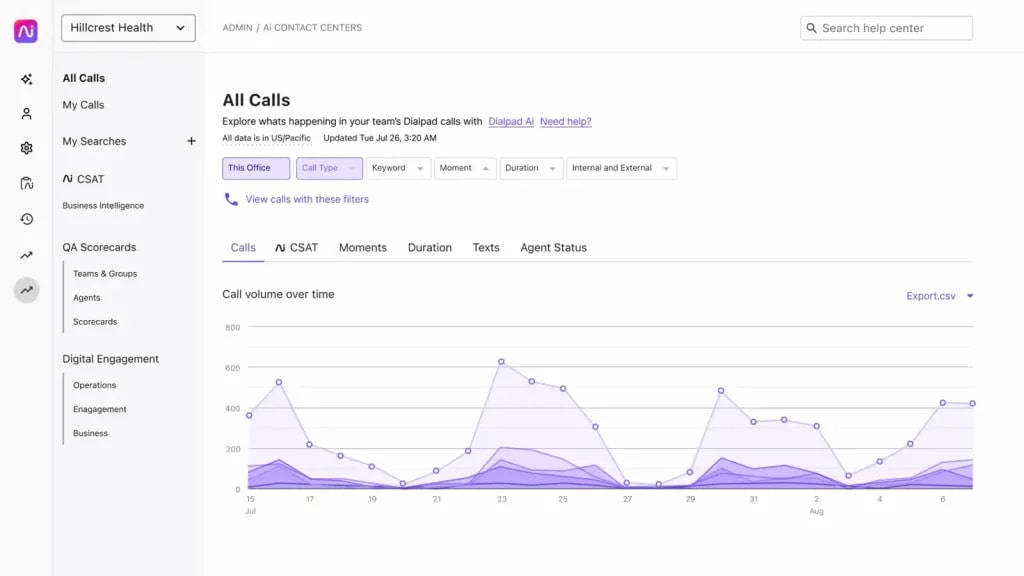
What is Dialpad Health?
Dialpad Health is an AI-powered VoIP and contact center solution designed with healthcare in mind. This HIPAA-compliant call center software for healthcare offers intelligent call routing and insights for both clinical and non-clinical staff. Let’s have a look at this HIPAA-compliant call center software for healthcare:
Dialpad Health Key Features:
- Voice intelligence with real-time transcription – Converts live conversations into accurate text instantly.
- Smart call summaries and analytics – Generates quick call overviews with actionable insights.
- Google Workspace and Microsoft 365 integrations – Works seamlessly with your everyday productivity tools.
- HIPAA-ready platform – Ensures secure, compliant communication across all patient interactions.
Dialpad Health Pros:
- Best-in-class AI transcription and call insights
- Intuitive mobile and desktop apps
Dialpad Health Cons:
- Some learning curve for AI features
Dialpad Health Pricing:
Here are the different Dialpad pricing plans:
- Standard Plan – $15/user/month: Great for small medical practices ready to modernize their communication. Includes unlimited HD calling and AI-powered meetings with built-in team messaging. Real-time transcripts and instant call summaries help healthcare staff stay focused on patient care.
- Pro Plan – $25/user/month: Designed for growing practices and hospitals managing multiple locations. Includes everything in the Standard Plan, plus key CRM integrations, 24/7 customer support, and tools for managing multi-office setups.
- Enterprise Plan – Custom Pricing: Tailored for large healthcare networks needing enterprise-grade communication. Includes everything in Pro, plus secure access with SSO, advanced user access controls, and support for unlimited office locations. Backed by 99.9% uptime for mission-critical reliability.
Best For: Innovative hospitals looking for AI-driven communication
Rating: 4.4 out of 5 stars on G2
7. Nextiva (Healthcare Edition)
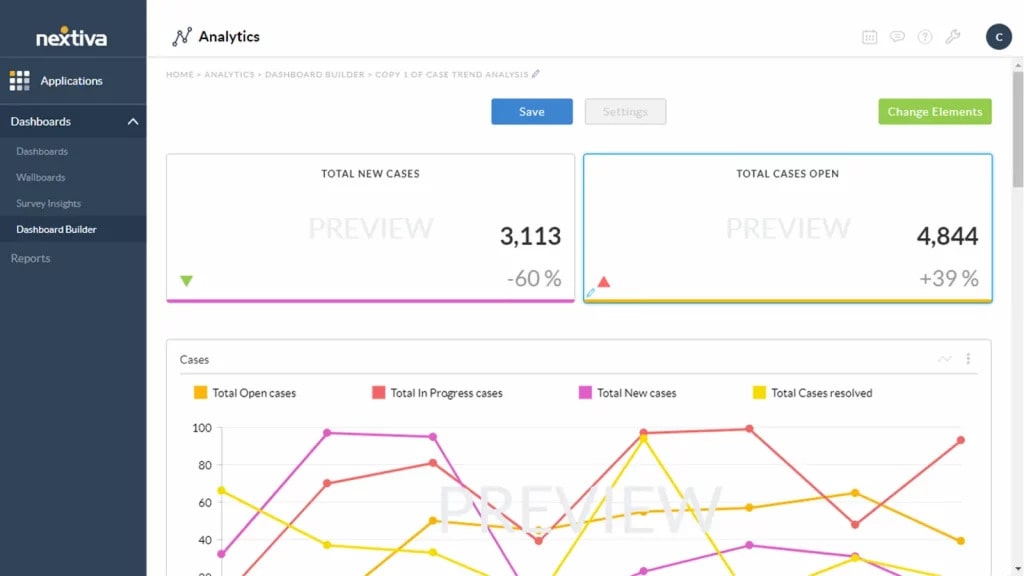
What is Nextiva?
Nextiva provides a business VoIP platform tailored for SMBs in healthcare. This cloud-based VoIP phone system for healthcare offers strong uptime guarantees, collaboration tools, and built-in HIPAA-compliant VoIP features. Here are quick details of this HIPAA-compliant phone system for healthcare:
Nextiva Key Features:
- Call management, IVR, and SMS support – Simplifies patient communication with organized calls, menus, and texts.
- HIPAA-compliant phone system for healthcare voice and messaging – Keeps all healthcare conversations private and regulation-ready.
- Call queuing and call recording – Manages high call volumes while securely storing conversations.
- CRM integrations – Connects seamlessly with your customer or patient management systems.
Nextiva Pros:
- Excellent support and service-level agreements (SLAs)
- Good integration capabilities
Nextiva Cons:
- Premium plans offered by this cloud-based VoIP phone system for healthcare may be expensive for small practices
Nextiva Pricing:
Here are the different Nextiva pricing plans:
- Digital Plan – $20/user/month (billed annually): Built for startups and smaller healthcare teams focused on digital engagement. Supports omnichannel messaging apps, social media, review monitoring, and a digital service helpdesk—all in one platform.
- Core Plan – $30/user/month (billed annually): A robust solution combining voice, video, SMS, and collaboration tools. Adds inbound/outbound voice, call routing, business SMS, video meetings, and file sharing—great for day-to-day hospital operations.
- Engage Plan – $40/user/month (billed annually): Expand your hospital’s communication with live web chat (bots included), MS Teams integration, advanced reporting, and toll-free numbers. Empowers growing teams to deliver seamless omnichannel care experiences.
- Power Suite – $60/user/month (billed annually): Enterprise-level support for large hospital networks and call centers. Includes advanced features like inbound call center, skills-based routing, ACD callback, and a supervisor dashboard for team management.
Best For: Small-to-medium hospitals and private practices
Rating: 4.5 out of 5 stars on G2
8. Vonage for Healthcare
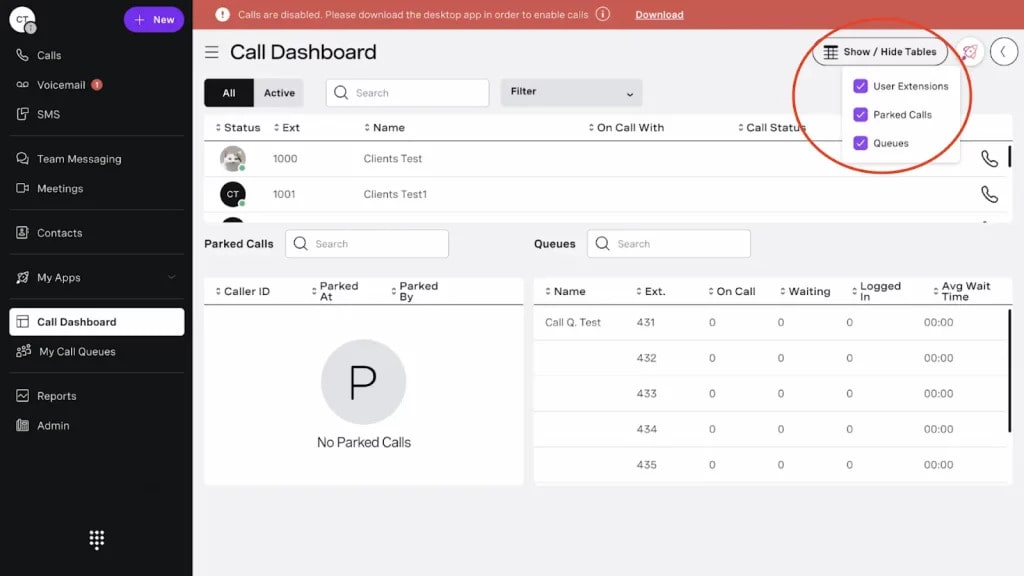
What is Vonage?
Vonage, another VoIP software for healthcare, offers a powerful unified communications system for healthcare, with a focus on telehealth and patient engagement. Here’s a quick look at this robust VoIP software for hospitals:
Vonage Key Features:
- VoIP, video, and messaging platform – Brings calling, video meetings, and messaging into one unified solution.
- HIPAA-compliant APIs for developers – Enables secure app integrations while maintaining healthcare compliance.
- Call analytics and contact center modules – Provides performance insights and tools to manage patient calls at scale.
Vonage Pros:
- Scalable for enterprise use
- Great for virtual care and remote staff
Vonage Cons:
- This VoIP software for healthcare requires technical setup for customizations
Vonage Pricing:
Here are the different Vonage pricing plans:
- Basic (Mobile) – $13.99/user/month (12-month promotion): An easy-to-use mobile and desktop VoIP solution perfect for solo healthcare practitioners or small clinics. Includes unlimited domestic calling, SMS/MMS, voicemail, and app access across devices.
- Premium – $20.99/user/month (12-month promotion): A feature-rich upgrade with VoIP desk phone support, video meetings (up to 200 participants), team messaging, SSO, and access to the VBC App Center.
- Advanced – $27.99/user/month (12-month promotion): Designed for multi-specialty clinics and hospital departments. Adds call groups, visual voicemail with transcription, and on-demand call recording (15 hours/month) to streamline internal communication and patient support.
Best For: Enterprise hospitals and multi-location healthcare systems
Rating: 4.3 out of 5 stars on G2
9. 8×8 Health
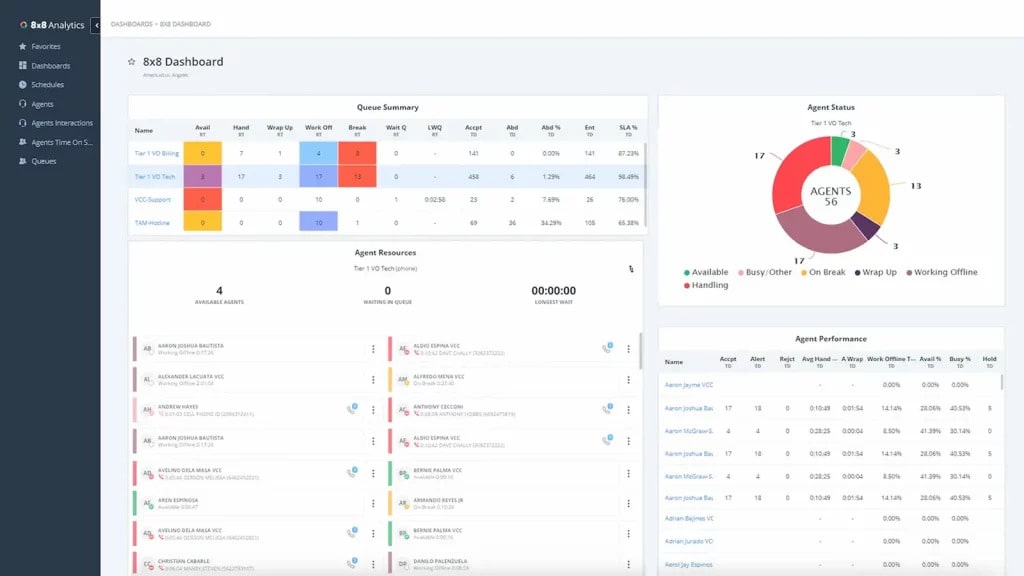
What is 8X8?
8×8 offers a specialized solution for healthcare with integrated VoIP and contact center functionality, focused on HIPAA-compliant VoIP and operational efficiency. Here are other details about this HIPAA-compliant phone system for healthcare:
8×8 Key Features:
- Omnichannel communication – Unifies phone, text, email, and chat in a single platform.
- Intelligent call routing and reporting – Directs calls efficiently while providing detailed performance reports.
- Integrated compliance tools for HIPAA and TCPA – Ensures secure, regulation-ready communication across all channels.
8×8 Pros:
- Enterprise-grade security
- High scalability
8×8 Cons:
- This HIPAA-compliant call center software for healthcare may be complex for small facilities
8×8 Pricing:
- 8×8 offers customizable pricing and packages, including Contact Center, Engage, and Communications APIs, to optimize healthcare communication with omnichannel routing, AI support, and seamless integration for superior patient care.
Best For: Large hospital networks and health systems
Rating: 4.2 out of 5 stars on G2
10. Cisco Webex Calling (Healthcare Edition)
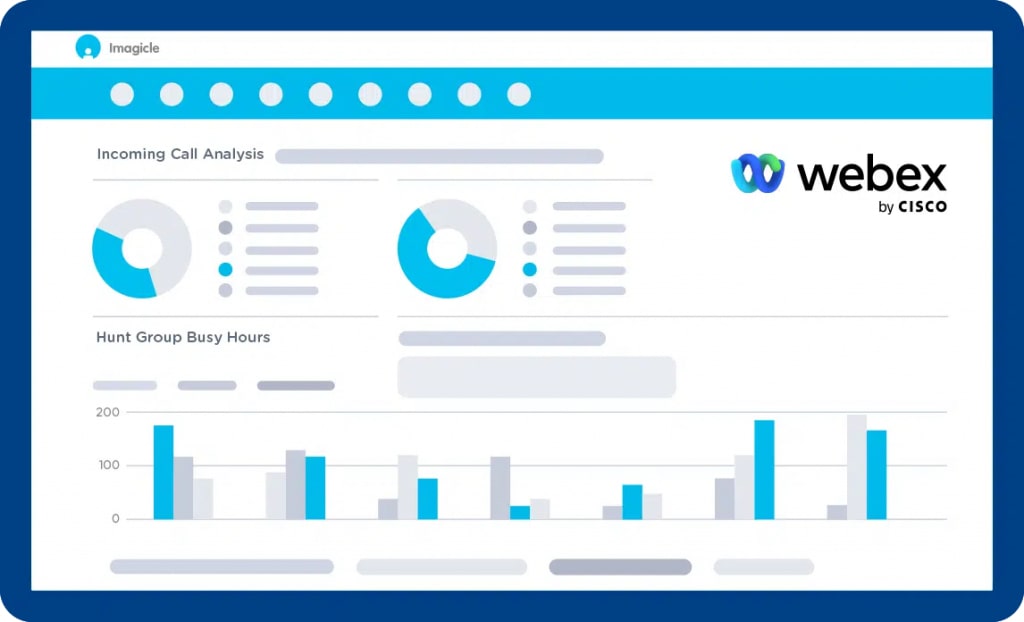
What is Cisco Webex Calling?
Cisco Webex Calling is a comprehensive enterprise VoIP platform with a dedicated healthcare edition. This VoIP software for healthcare ensures security, compliance, and reliability. Let’s have a quick look at this VoIP software for hospitals:
Cisco Webex Calling Key Features:
- Enterprise VoIP with end-to-end encryption – Secures all calls with complete encryption for maximum privacy.
- Integrations with EHR and scheduling platforms – Connects seamlessly with patient records and appointment systems.
- Redundancy and uptime failover – Ensures continuous service even during technical disruptions.
- Emergency call handling features – Prioritizes critical calls for timely response in urgent situations.
Cisco Webex Calling Pros:
- Global reliability and infrastructure
- Advanced compliance and monitoring
Cisco Webex Calling Cons:
- This VoIP software for healthcare has higher upfront costs
Cisco Webex Calling Pricing:
This HIPAA-compliant call center software for healthcare offers four pricing plans:
- Webex Free – ₹0 /user/year: Unlimited 40-minute meetings, 100 participants, screen sharing, whiteboards, local recording, messaging, app integrations, and basic support.
- Webex Starter – ₹780 /user/month (₹9,360 billed yearly): Includes everything in Free, plus AI Assistant, 24-hr meetings, 150 participants, 5GB cloud recording, live polling, closed captions, and advanced support.
- Webex Business – ₹1,025 /user/month (₹12,300 billed yearly): Includes everything in the starter plan, along with 200 participants, 10GB of AI-powered cloud recordings.
- Webex Enterprise – Custom pricing.
Includes everything in Business, plus 1,000 participants, unlimited cloud/local recordings, FedRAMP security, and Webex Events (in select plans).
Best For: Hospitals needing enterprise-grade infrastructure
Rating: 4.5 out of 5 stars on G2
Why Emitrr Is the Best VoIP Provider for Hospitals?
Among the various VoIP providers available for hospitals, Emitrr stands out for its healthcare-specific features, ease of use, and cost-effectiveness. Here are some of the key feature of this VoIP software for healthcare:
- HIPAA-Ready and Designed for Healthcare Workflows: Emitrr, the best VoIP software for hospital, ensures all communication is secure with HIPAA-compliant encryption, making it a top choice for hospitals concerned about regulatory compliance.
- All-in-One Communication: Emitrr integrates voice calls, SMS, appointment reminders, and alerts in one platform, offering a comprehensive solution for hospitals to streamline patient communication and reduce administrative workload.
- Seamless Integrations: This VoIP software for hospitals seamlessly integrates with leading EHRs and CRMs, allowing hospitals to access patient information during calls and ensuring smooth workflows.
- User-Friendly Interface: With a simple and intuitive interface, Emitrr is easy for both medical and non-technical staff to use, reducing training time and enhancing overall adoption.
- 24/7 Onboarding and Support Team: Emitrr offers 24/7 onboarding assistance and customer support, ensuring your hospital team can get help whenever needed.
- Affordable Pricing for Multi-location or Specialty Hospitals: Emitrr’s pricing model is designed to accommodate both multi-location hospitals and smaller, specialty clinics, offering scalable and affordable solutions.

FAQs
VoIP software is the platform that enables voice communication, while VoIP service refers to the underlying infrastructure and connectivity provided by a VoIP provider.
Yes, VoIP can replace traditional landline systems, offering better scalability, security, and integration options for hospitals.
Yes, with the right configuration and redundancy in place, VoIP systems can be as reliable as landlines for emergency communications.
VoIP systems protect patient data by using encrypted calls, secure data storage, and access controls, ensuring compliance with HIPAA and other regulations.
Implementation time typically ranges from a few weeks to a couple of months, depending on the hospital’s complexity and integration needs.
Yes, VoIP systems can manage both internal communication between hospital staff and external communication with patients and other stakeholders.
Conclusion
Choosing the right VoIP software isn’t just a tech decision—it’s a strategic move that directly impacts patient care, staff efficiency, and overall hospital performance. With hospitals facing increasing pressure to deliver faster, more secure, and more coordinated care, a robust communication platform is non-negotiable.
When evaluating options, the key is to prioritize compliance with healthcare regulations (like HIPAA), seamless integration with existing hospital systems (like EHR/EMR), and responsive customer support tailored to healthcare needs.
Among the many options available, Emitrr stands out as the most purpose-built VoIP solution for hospitals, offering unmatched features that align with the real-world demands of healthcare providers.
Ready to take the next step? Schedule a free demo with Emitrr today to see how it can transform your hospital’s communication.

 4.9 (400+
reviews)
4.9 (400+
reviews)
